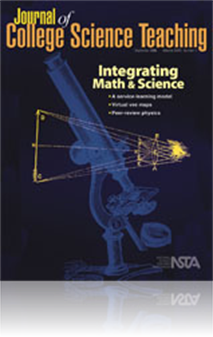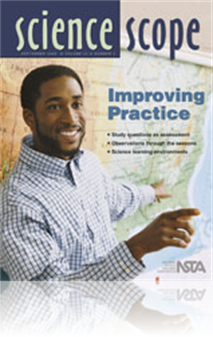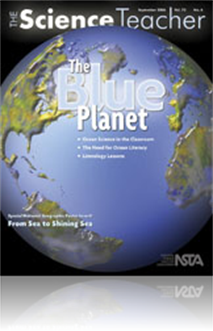All Resources
Journal Article
Editorial: Discipline-Based Research in College Science Teaching
We are, all of us, devoted to our sciences. For college science faculty this devotion to our respective disciplines extends in part to teaching. We share a common characteristic: we have extensive training and experience in the methods of science a...
Journal Article
For Mr. Kim's fifth-grade students, recess is not just for playing and getting exercise! One spring, he observed a small group of his students near their class bluebird box, examining various bird feathers found on the ground. Building on students'...
Journal Article
The Virtual Vee Map: A Template for Internet Inquiry
The Virtual Vee Map proved successful in promoting student learning in the areas of inquiry and data analysis using resources and data available on the internet. A postsurvey found that a majority of students enjoyed collecting and interpreting the ...
Journal Article
If the words "science fair" strike fear in your heart, you're not alone. While few disagree that science fair projects have great potential for student learning, the preparation and execution of projects can be stressful for teachers, students, and ...
Journal Article
For several years, many of the authors' new-school-year resolutions have revolved around a common theme: improving the introduction of inquiry skills to young (kindergarten through second grade) learners, particularly students with limited English-la...
Journal Article
Editor's Note (September 2006)
Investigation skills are taught for several reasons--to help students become better thinkers and problem solvers; to help them be better versed in the nature of scientific work; and to help them remember content and facts. We know that students do n...
Journal Article
Yes! We are Rocket Scientists!
Launch your middle school students' interest, incorporate hands-on/minds-on learning, and focus on inquiry learning while still meeting state and national standards by implementing the following water-bottle rocket activity into your physical science...
Journal Article
As prices soar to over $3 a gallon, “it” has become a hotly contested political issue. Wars and other international conflicts have erupted over access to “it,” and pumping “it” out of the ground has become more and more expensive. If you�...
Journal Article
A Course in Nanotechnology for Nonscience Majors
Chemistry is a good entry to many topics in nanotechnology. This paper describes a non-science majors' course in which chemical concepts provide the background to the study of this new field....
Journal Article
Be A Citizen Scientist! Celebrate Earth Science Week 2006
During Earth Science Week (October 8-14, 2006), millions of citizen scientists world-wide sampled groundwater, monitored weather, toured quarries, explored caves, prepared competition projects, and visited museums and science centers to learn about E...
Journal Article
Investigating Students' Ideas About Plate Tectonics
As part of a project designed to develop, among other tools, an assessment for measuring middle school understanding in plate tectonics, researches from Horizon Research, Inc. (HRI)--a research firm specializing in science and mathematics education--...
Journal Article
Favorite Demonstration: Forensic Analysis Demonstration via Hawaii Five-O
The interdisciplinary nature of a forensics-based demonstration encourages science majors to move beyond their own narrow fields of study. The demonstration described in this column emphasizes the interconnectedness of biology, chemistry, and geolog...
Journal Article
A Message from the NSTA President: Quality Science Teachers -- Essential to America's Future
Our nation has begun to take science and the accomplishments of scientists in the United States for granted. The telephone, airplane, automobile, electric power, atomic fuel, vaccine, transplants, medicines--all of the discoveries of the past centur...
Journal Article
Science 101: Why does air expand when you heat it, and why does hot air rise?
The short answer to the questions in the title are that air doesn't necessarily expand when you heat it, and hot air doesn't always rise. These two commonly misunderstood concepts related to the behavior of gases and how this behavior applies to phy...
Journal Article
Society for College Science Teachers: iPods -- Informative or Invasive?
The ubiquitous devices, known as iPods, are being used in a variety of teacher-centered ways. In some classes, students are using them to record interviews and produce reports or other audio or video products to be shared with other students. The m...
Journal Article
There's More to Teaching Science
There's more to teaching science than stuffing kids with facts. They have to learn to question, to observe, and to explore. Kids need to think like scientists; to sort and sift and muse. Encourage novel thinking; new approaches and different ways....
Journal Article
Every Day Science Calendar: September 2006
This monthly feature contains facts and challenges for the science explorer. ...
Journal Article
Score One for Alternative Assessment
"What conventional testing hides is the enormous misunderstanding that many students have about things the generic standardized tests say they 'know'...students possess a great deal of knowledge that hides a great deal of understanding." This article...
Journal Article
A "Nature of Science" Discussion: Connecting Mathematics and Science
Nonscience majors often come into science courses with misconceptions about the nature of science. As part of an integrative mathematics and science course, we have structured a continued dialogue regarding the nature of science through inquiry-base...
Journal Article
Ask the Experts -- September 2006
In this month's "Ask the Experts" column, the Experts respond to the following thought-provoking questions: "If water boils at 100°C, how can a glass full of water evaporate at room temperature, about 20-25°C? "Why do glaciers look blue?" and "How ...
Journal Article
Unlocking Reading Comprehension with Key Science Inquiry Skills
As secondary science teachers, we must remember that scientific literacy cannot be attained without fundamental literacy--the ability to read and comprehend textual information and write competently about the subject under study. To achieve literacy ...
Journal Article
Teachers have created a huge misconception for students and non-scientists who read and use textbooks. They have come to believe that science is absolute and not open to challenge. Worse still for the scientific community is the fact that, in commo...
Journal Article
Our Moon, Luna, will be the focus of the Scope on the Skies columns for this coming school year. Data and information will be provided so that each month you and your students can follow the Moon and the Earth as the two orbit together around the Sun...






